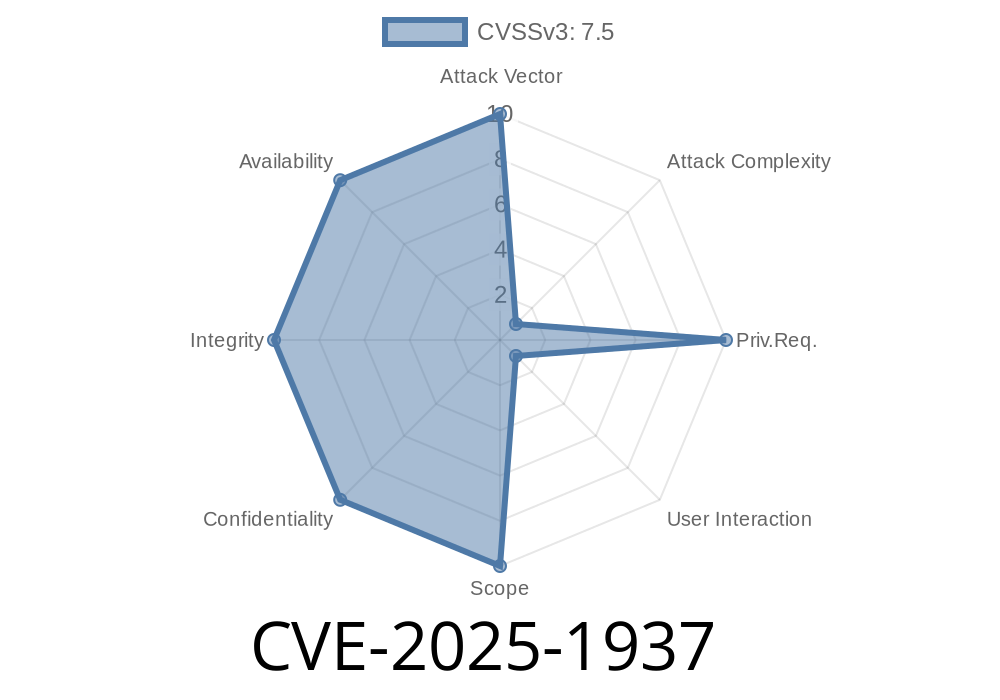---
Introduction
If you’re using Firefox or Thunderbird, especially older versions, it’s time to pay attention. A new vulnerability tracked as CVE-2025-1937 has been identified in various releases of Firefox and Thunderbird, potentially allowing attackers to run arbitrary code through memory corruption. Here, we’ll break down what this means in plain English, show you how the exploit could work, and advise what you need to do right now.
Thunderbird 128.7
Memory safety bugs are flaws in how the program handles memory—basically, the rules of where data can live while it’s running. If these rules are broken, attackers could trick the program into running malicious code instead of just crashing.
Thunderbird ESR before 128.8
If you’re using any of these, you are vulnerable.
How Does the Bug Work?
The details are technical, but it boils down to the program mishandling objects in memory—like freeing an object and then using it again, or reading/writing outside the allocated memory space. These logic flaws can allow an attacker to corrupt memory and, with enough skill, trick the application into executing attacker-provided code. This kind of bug includes use-after-free, heap buffer overflow, or out-of-bounds read/write.
Let’s look at a simplified (and hypothetical) code snippet that demonstrates a use-after-free bug:
// Hypothetical Example Only: Not actual Mozilla code
class Widget {
public:
void doSomething();
};
void vulnerableFunction() {
Widget* ptr = new Widget();
delete ptr; // Frees memory
ptr->doSomething(); // Use-after-free: ptr now points to freed memory!
}
In a real browser scenario, this kind of logic bug can be abused if an attacker can control what gets placed at the freed memory location, making it possible to run arbitrary (attacker-supplied) code.
Exploitation: What Could an Attacker Do?
Mozilla’s security team flagged these bugs because some of them showed _evidence of memory corruption_. While they haven’t published live exploits or confirmed full remote code execution, the presence of memory corruption means that, given enough effort, someone could eventually develop a way to take over your computer simply by getting you to visit a malicious website or open a booby-trapped email.
The attacker sets up a website containing exploit code (often JavaScript or crafted content).
2. Unsuspecting user visits the site in a vulnerable version of Firefox or opens an email in Thunderbird.
3. Exploit code triggers the memory bug, corrupts memory, and possibly gains control to execute malicious code on the victim’s computer.
Here’s a very simple (pseudo-JavaScript) sketch of a possible exploitation flow for a use-after-free bug:
// Hypothetical — Do not use in production
function triggerBug() {
// Prepare memory allocation patterns
let arr = [];
for (let i = ; i < 10000; i++) {
arr.push({data: new Array(1024).fill('A')});
}
// Free the object in C++ code (browser's internals)
// Spraying the heap to place attacker-controlled data at freed memory
// If vulnerable, browser may execute attacker-controlled code
}
Again, this is not the actual exploit but illustrates how attackers generally approach these bugs.
References and Original Sources
- Mozilla Foundation Security Advisory 2025-1937 ← Official disclosure
- CVE Details: CVE-2025-1937
- Release notes Firefox 136
- Bugzilla: Fixed memory safety bugs
For Thunderbird: Update to version 136 or higher.
- If you’re using Firefox ESR or Thunderbird ESR, update to 115.21/128.8 or newer.
Mozilla releases security updates regularly. Go to Help > About in your application menu to check for updates.
Final Thoughts
Bugs like CVE-2025-1937 are serious because they break the basic rules about how programs use memory. If you skip updates, you’re at risk for being hacked—even when just browsing the web or reading email. Don’t wait for malware to strike.
Timeline
Published on: 03/04/2025 14:15:38 UTC
Last modified on: 03/12/2025 22:15:34 UTC
